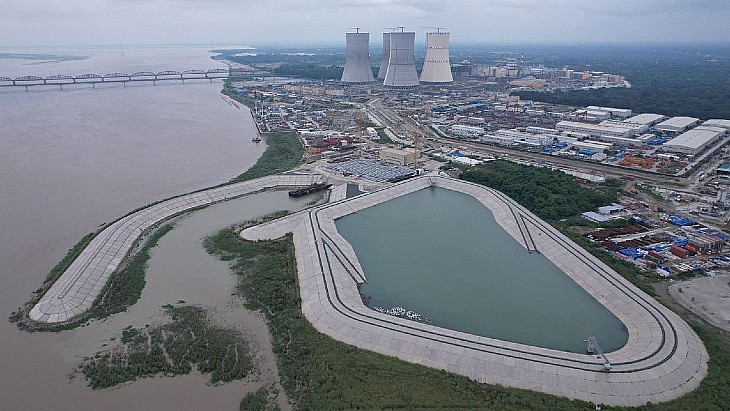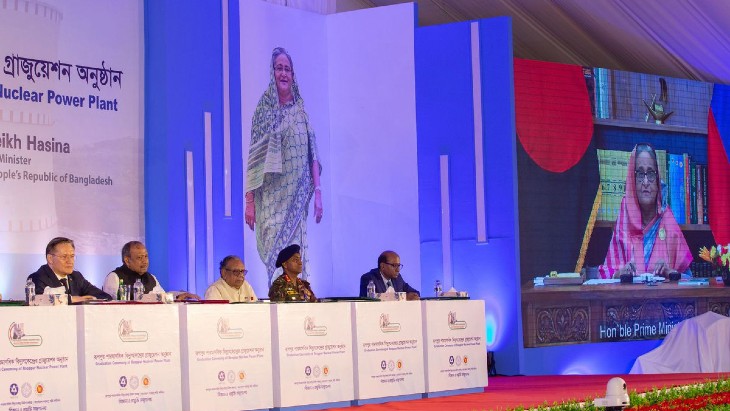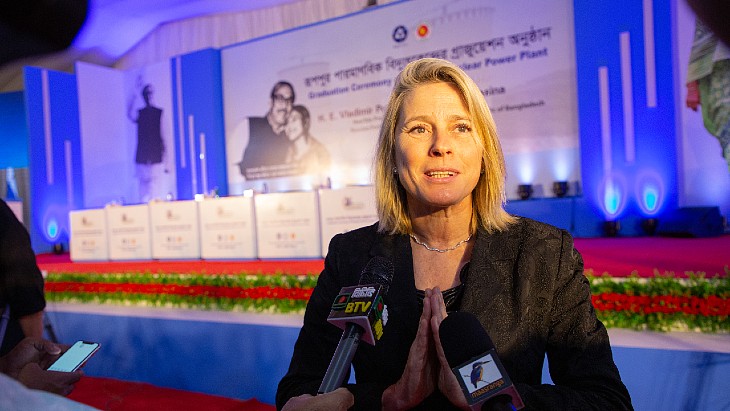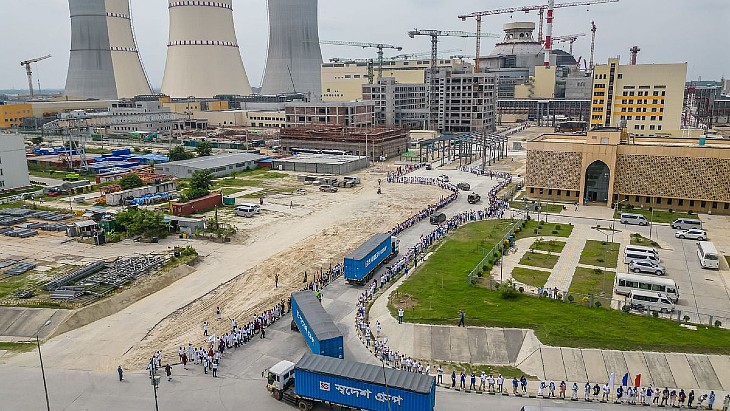The arrival of nuclear fuel marks the moment that the site gets the status of a nuclear facility, and also means that Bangladesh officially joins the world's "nuclear" countries.
The Rooppur plant, 160 kilometres from the capital Dhaka, features two Russian VVER-1200 reactors. Construction of the first unit began in November 2017 and it is scheduled to be commissioned in 2024. Construction of the second unit began in July 2018. They have an initial life-cycle of 60 years, with a further 20 year extension possible.
 An aerial shot, taken in September, shows the size of the project (Image: Rosatom)
An aerial shot, taken in September, shows the size of the project (Image: Rosatom)
In his address, via weblink, Grossi said it was an "important, historic" and "auspicious" occasion. He congratulated Bangladesh's Prime Minister on fulfilling her father's dream of nuclear energy in the country, and said that the IAEA had been, and would be, with the country "every step of the way". He said that the IAEA, which seeks to ensure the safety and security of the peaceful use of nuclear technology, understood the "indispensable role nuclear plays in development".
Rosatom Director General Alexei Likhachev, speaking at the ceremony, said: "This day marks a new stage in the development of Russian-Bangladeshi relations. For Rosatom, it is a great honour to implement a project which will ensure stable power supply and will help to preserve the unique nature of Bangladesh for future generations."
Architect Yeafesh Osman, Bangladesh Minister for Science and Technology, said: "We've been waiting for this special moment for a long time. It is a celebration not only for the people of Pabna district but also for the entire nation. On 5 October we received the fuel delivery certificate, which itself speaks about our achievements as a nation. Bangladeshi people are vibrant and colourful and we are going to celebrate it in a very colourful manner. The entire nation is in festive mood."

The 'graduation ceremony' of the plant (Image: Rosatom)
During the ceremony, the leaders of the two countries, appearing via weblink, gave symbolic permission for the delivery of the nuclear fuel to the site. The fuel was manufactured at Novosibirsk Chemical Concentrates Plant in Russia, part of Rosatom, and transported by air and road under the supervision of the Bangladesh Atomic Energy Authority.
In his speech, President Putin noted the close ties between the two countries, and said that once at full capacity the plant would supply about 10% of Bangladesh's energy needs while also helping to cut carbon dioxide emissions, which would provide benefits for the environment and people's health in the country.
He said that 20,000 people - mostly from Bangladesh - were currently involved in the construction project with many more jobs resulting from the local firms used to "carry out construction and installation work, supply materials, provide transport and other services". With the growing number of nuclear students and specialists from Bangladesh being trained, he said "we are creating not just a nuclear power plant, we are creating in Bangladesh together ... an entire nuclear industry, an industry of peaceful atoms".
The president added: "Russia is not just building a station - we will provide assistance to our Bangladeshi partners throughout the entire life cycle of the nuclear project, including obligations for the long-term supply of reactor fuel, maintenance of the nuclear power plant, as well as for the management of spent nuclear material."
According to the The Business Standard, Bangladesh's Prime Minister Sheikh Hasina thanked Russia for its friendship and said the country was committed to using nuclear power for peace and prosperity and said the plant would be part of the country's vision for a "Smart Bangladesh".

Bilbao y León welcomed Bangladesh into the nuclear community (Image: Rosatom)
World Nuclear Association Director General Sama Bilbao y León, also at the ceremony, said: "This delivery represents the moment when Bangladesh joins the 32 other countries around the world utilising nuclear power for 24/7 clean energy - and represents a significant contribution to helping Bangladesh reach its carbon emission reduction targets whilst strengthen energy security and reliability. The significance of this moment extends beyond Bangladesh, with the global nuclear community committed to accelerating new build projects the Rooppur power plant is a powerful symbol of this shared commitment ... the completion of this project in under 10 years - for a newcomer country - is a testament of international collaboration and demonstrates that we can build nuclear reactors efficiently ... let us renew our commitment to working together towards a sustainable future and creating a better world for all."





_13505.jpg)
_87975.jpg)
_67826.jpg)
_87695.jpg)





